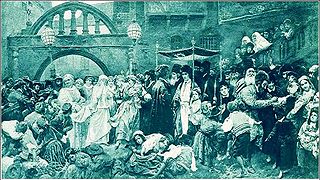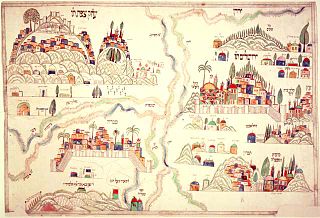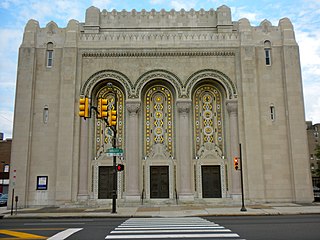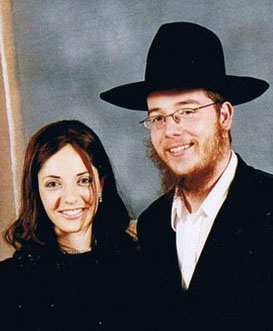
Judaism is an Abrahamic, monotheistic, and ethnic religion. It comprises the collective spiritual, cultural, and legal traditions of the Jewish people, having originated as an organized religion in the Middle East during the Bronze Age. Contemporary Judaism evolved from Yahwism, the cultic religious movement of ancient Israel and Judah, around the 6th/5th century BCE, and is thus considered to be one of the oldest monotheistic religions. Religious Jews regard Judaism as their means of observing the Mosaic covenant, which was established between God and the Israelites, their ancestors. Jewish religious doctrine encompasses a wide body of texts, practices, theological positions, and forms of organization.

In Judaism, the Seven Laws of Noah, otherwise referred to as the Noahide Laws or the Noachian Laws, are a set of universal moral laws which, according to the Talmud, were given by God as a covenant with Noah and with the "sons of Noah"—that is, all of humanity.

The Talmud is the central text of Rabbinic Judaism and the primary source of Jewish religious law (halakha) and Jewish theology. Until the advent of modernity, in nearly all Jewish communities, the Talmud was the centerpiece of Jewish cultural life and was foundational to "all Jewish thought and aspirations", serving also as "the guide for the daily life" of Jews.

Neturei Karta is a fringe religious group of Haredi Jews, formally created in Jerusalem, then in Mandatory Palestine, in 1938, splitting off from Agudas Yisrael. Neturei Karta opposes Zionism and calls for a "peaceful dismantling" of the State of Israel, in the belief that Jews are forbidden to have their own state until the coming of the Jewish Messiah and that the state of Israel is a rebellion against God.

Messianic Judaism is a modernist and syncretic movement of Protestant Christianity that incorporates some elements of Judaism and other Jewish traditions into evangelicalism.
Philosemitism is a notable interest in, respect for, and appreciation of the Jewish people, their history, and the influence of Judaism, particularly on the part of a non-Jew. In the aftermath of World War II, the phenomenon of philosemitism saw a great increase throughout Europe following the Holocaust, reshaping the relationship between Jews and European societies. American historian G. Daniel Cohen states that philosemitism "can indeed easily recycle antisemitic themes, recreate Jewish otherness, or strategically compensate for Holocaust guilt".

Mikveh or mikvah is a bath used for the purpose of ritual immersion in Judaism to achieve ritual purity.

Conversion to Judaism is the process by which non-Jews adopt the Jewish religion and become members of the Jewish ethnoreligious community. It thus resembles both conversion to other religions and naturalization. The procedure and requirements for conversion depend on the sponsoring denomination. Furthermore, a conversion done in accordance with one Jewish denomination is not a guarantee of recognition by another denomination. Normally, though not always, the conversions performed by more stringent denominations are recognized by less stringent ones, but not the other way around. A formal conversion is also sometimes undertaken by individuals whose Jewish ancestry is questioned or uncertain, even if they were raised Jewish, but may not actually be considered Jews according to traditional Jewish law.
Jewish leadership has evolved over time. Since the destruction of the Second Temple in Jerusalem in 70 CE, there has been no single body that has a leadership position over the entire Jewish diaspora. Various branches of Judaism, as well as Jewish religious or secular communities and political movements around the world elect or appoint their governing bodies, often subdivided by country or region.

Sufganiyah is a round jelly doughnut eaten in Israel and around the world on the Jewish festival of Hanukkah. The doughnut is deep-fried, injected with jam or custard, and then topped with powdered sugar. The doughnut recipe originated in Europe in the 16th century, and by the 19th century was known as a Berliner in Germany. Polish Jews, who called it a ponchik, fried the doughnut in schmaltz rather than lard due to kashrut laws. The ponchik was brought to Israel by Polish Jewish immigrants, where it was renamed the sufganiyah based on the Talmud's description of a "spongy dough".

A Jewish wedding is a wedding ceremony that follows Jewish laws and traditions. While wedding ceremonies vary, common features of a Jewish wedding include a ketubah which is signed by two witnesses, a chuppah or huppah, a ring owned by the groom that is given to the bride under the canopy, and the breaking of a glass.

Noahidism or Noachidism is a monotheistic Jewish religious movement aimed at non-Jews, based upon the Seven Laws of Noah and their traditional interpretations within Orthodox Judaism.

Sabato Morais was an Italian-American rabbi of Portuguese descent, leader of Mikveh Israel Synagogue in Philadelphia, pioneer of Italian Jewish Studies in America, and founder of the Jewish Theological Seminary, which initially acted as a center of education for Orthodox Rabbis.

The Four Holy Cities of Judaism are the cities of Jerusalem, Hebron, Safed and Tiberias which were the four main centers of Jewish life after the Ottoman conquest of Palestine.

Rabbi Arie Zeev Raskin is the Chief Rabbi of Cyprus and the first rabbi on the island in many years.
The history of the Jews in the United Arab Emirates describes the historical and modern presence of Jews over the millennia in the Middle East and the recorded meetings with Jewish communities in areas that are today in the geographic territories of the United Arab Emirates.

Rabbi Shimon Lazaroff is the current Texas Regional Director for Texas Friends of Chabad Lubavitch, Inc. and member of the board and executive committee of Agudas Chasidei Chabad. With the direction of the Lubavitcher Rebbe, Rabbi Menachem Mendel Schneerson, he established Chabad Lubavitch in Texas upon his arrival with his family in 1972.

Congregation Rodeph Shalom of Philadelphia, founded in 1795, is the oldest Ashkenazic synagogue in the Western Hemisphere. It is noted historically for its leadership of the Reform Judaism among American Hebrew congregations, for its spiritual influence upon international Jewry, and for its unique 1927 Moorish Revival building on North Broad Street, on the National Register of Historic Places for many decades.

Gavriel Noach Holtzberg (Hebrew: גבריאל נח הולצברג; June 9, 1979 – November 26, 2008 was an Israeli American Orthodox rabbi and the Chabad emissary to Mumbai, India, where he and his wife Rivka ran the Mumbai Chabad House. He was also a religious leader and community builder for the local Jewish Indian community, and led the Friday-night Shabbat services at the Knesset Eliyahoo synagogue. Holtzberg and his wife were murdered during the 2008 Mumbai attacks perpetrated by the Islamic militant group Lashkar-e-Taiba.

Shmuel Shapiro (Hebrew: שמואל שפירו, a French Jewish rabbi, hazzan, singer, composer, lecturer, and former Chief Rabbi of Meurthe-et-Moselle and Nancy, France, was born in Aix-les-Bains, France, on January 26, 1974.
















